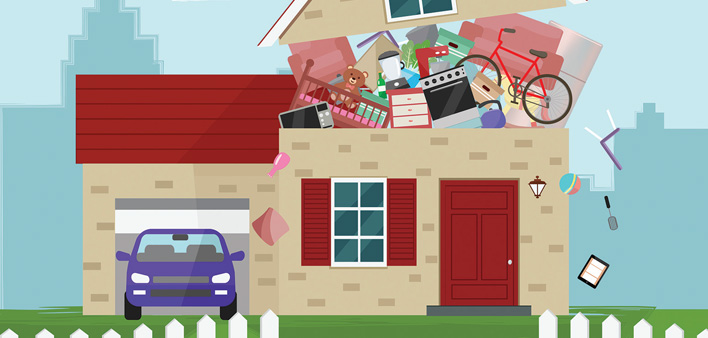By Shelley Galasso Bonanno, M.A.
Letting go can be hard. Letting go of “stuff ” can be particularly difficult for many. We surround ourselves with stuff that often simultaneously seems both important and useless. We sometimes hold onto unnecessary items with the rationalization that we might need them one day. Monetary valuables, such as furniture and clothing, as well as emotionally valuable items such as greeting cards, dried flowers and letters, never seem to stop accumulating. Often times, purging our lives of clutter is a conscious choice, while on other occasions, we are forced to confront the process of letting go of a lifetime of possessions through the death of a relative or a move to a new home. And the task can be both physically and emotionally daunting.
But why do so many of us hold onto so much stuff?
Nostalgia seems to have a strong pull. Holding onto keepsakes provides a tangible container for memories and it can distract us from letting go of feelings. Attaching emotional meanings to things – associating the tangible with intangible, arouses complicated and often conflicted feelings about letting go of mementos. Feelings, both those we associate with items and the actual deeper emotional issues, some of which we may not be consciously aware, can make clearing out a space seem nearly impossible. It can mean coming to terms with the unthinkable or confronting feelings of loss and pain, which is sometimes easier to avoid. So ironically, holding onto a great deal of sentimental objects can be a source of both pain and pleasure.
While there is no question letting go of clutter can be difficult, the benefits of letting go far outweigh the negatives for most people. Baggage can weigh us down. Clutter takes up not only physical space in our lives, but mental space too. This clutter can keep us from feeling productive and happy. Hanging onto more objects than we need, rather than motivating us, can hold us back. Getting rid of stuff frees up space, both mentally and physically. Letting go of material things can free up space for healthy habits and can help many people find increased purpose, clarity and focus.
So, while we may be initially reluctant to let go of our stuff, not only for its potential material worth, but for its emotional value, understanding what keeps us tied to our possessions can be liberating. It can help you view your external world in a clearer light. Understanding that connection between your emotions and your possessions, finally allows you the freedom to let go (literally and figurately) of all that, “stuff.”
 A lifelong resident of Macomb County, Shelley Galasso Bonanno is a practicing limited licensed psychologist who completed her Master’s degree at Wayne State University in 1987. She has a breadth of experience in working with adults, children, and families. In addition to working in private practice, Bonanno performs consultative services for State and forensic agencies. Her writings have appeared in various online and print publications. An advocate for mental health, you can follow her on Twitter @shelley bonanno.
A lifelong resident of Macomb County, Shelley Galasso Bonanno is a practicing limited licensed psychologist who completed her Master’s degree at Wayne State University in 1987. She has a breadth of experience in working with adults, children, and families. In addition to working in private practice, Bonanno performs consultative services for State and forensic agencies. Her writings have appeared in various online and print publications. An advocate for mental health, you can follow her on Twitter @shelley bonanno.


